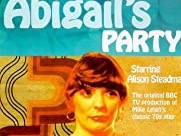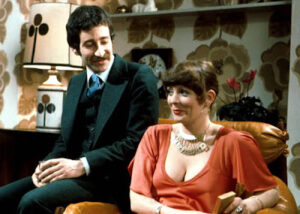Abigail’s Party ***** (1977, Alison Steadman, Tim Stern, Janine Duvitski, John Salthouse, Harriet Reynolds) – Classic Movie Review 10,580

The 1977 British TV classic Abigail’s Party is a savagely funny BBC comedy drama devised and directed by Mike Leigh. This wicked attack on lower-middle-class manners is particularly memorable for Alison Steadman’s formidable portrayal of Beverly.
The 1977 British TV classic Abigail’s Party is a savagely funny BBC comedy drama devised and directed by Mike Leigh, the master of the improvised stage and television play and, of course, film.
This viciously wicked attack on pretentious lower-middle-class manners is particularly memorable for Alison Steadman’s formidable, award-winning portrayal of Beverly, the bored, bitchy hostess of a sitting-room get-together of married couples. The monstrous Beverly has invited her tedious married new neighbours Angela (Janine Duvitsky) and Tony (John Salthouse) in for welcoming drinks, as well as her depressed, divorced middle-class neighbour Sue (Harriet Reynolds), who is sheltering from her teenage daughter Abigail’s party next door.
The hostess’s hen-pecked, desperate husband Laurence (Tim Stern), an estate agent with ‘Wibley Webb’, comes in late from work just before the party starts. Beverly and Laurence immediately start taking pot shots at each other, and it just gets worse and worse, and funnier and funnier. Beverly encourages everyone to get drunk, making Angela increasingly happy and Sue throw up.
Janine Duvitsky as the dim, cringing nurse Angela and John Salthouse as her stoic, soccer-playing husband Tony also create outstanding and memorable characters. Angela’s a nurse though you would never know it as she doesn’t seem to have anything like caring side, though she does eventually step up in a couple of crises. Tony’s a dullard in computers – a mere computer operator – but used to play for Crystal Palace in the first team (as did John Salthouse). Harriet Reynolds is a study of a woman at the end of her tether, but then all the characters here are hilariously on the verge.
Did I mention Laurence has artistic pretentions, with a set of bound Shakespeare volumes: ‘Our nation’s culture. Not something you can actually read, of course.’ Beverly’s more interested in her own kind of art hanging on her bedroom wall: ‘Just because a picture happens to be erotic, does not make it pornographic.’
Apparently the first full-length British TV drama to be partly improvised, it was first staged at London’s Hampstead Theatre in April 1977 , before this 1977 BBCtv Play for Today production, first aired on 1 November 1977. A recording shot on video was arranged at the BBC, produced by Margaret Matheson for BBC Scotland, and it became perhaps the most famous Play For Today. The original play, devised and directed by Mike Leigh, developed in lengthy improvisations in which the actors explored the characters.
The BBC version is a film of a play. Leigh commented sourly: ‘This is not a film. For a film-maker, it’s a work of deep embarrassment and pain. There is no piece of work for which I have been responsible as director by which I’m embarrassed. Not for the play or its content, It is a stage play that was wheeled into a television studio. It’s slightly compromised as a play, but not too seriously. However, as a piece of craft, it’s simply appalling.’ This is puzzling, as he directed it.
Alison Steadman based Beverly on a woman she knew at her Essex drama school and a woman she saw demonstrating a make-up range at a department store.
[Spoiler alert] Abigail never appears.
2 minutes, cut from over two hours on stage.
Beverly plays the record ‘Light My Fire’ by José Feliciano on stage but in the TV production it is ‘Forever and Ever’ by Demis Roussos (‘We don’t want to listen to that fat Greek caterwauling all night’) and Tom Jones replaces Elvis Presley. The music had to be replaced with artists recorded on British labels for copyright reasons. ‘Love to Love You Baby’ is sung by Clare Torry as Donna Summer’s version had been banned by the BBC because it featured ‘orgasmic moans’. Also playing is ‘Blue Theme’, a piece of library music by Robert Farnon.
The original stage production starred Alison Steadman as Beverly, Tim Stern as Laurence, Janine Duvitski as Angela and John Salthouse as Tony, but Thelma Whiteley played Sue on stage.
TV dramatist Dennis Potter judged that it was ‘based on nothing more edifying than rancid disdain, for it is a prolonged jeer, twitching with genuine hatred, about the dreadful suburban tastes of the dreadful lower middle classes’. You can agree with him and still find the play/ film hilarious.
The last word goes to Mike Leigh. He said in 2009: “Of course I recognise the enduring popularity of Abigail’s Party. It still hits a nerve about the way we live. It’s real even though it’s apparently a heightened and comic play. It’s a reflection of the realities of how we live on several different levels. It’s about aspirationalism and materialism, love and relationships. Like much of my work, it’s about the disease I call ‘the done thing’ – basically, keeping up with the Joneses. It’s actually quite a complex play. People may not analyse its complexity but it’s so popular precisely for that reason.’
Leigh and Steadman married in 1973 and had two sons, but separated in 1995 and divorced in 2001.
© Derek Winnert 2019 Classic Movie Review 10,580
Check out more reviews on http://derekwinnert.com



